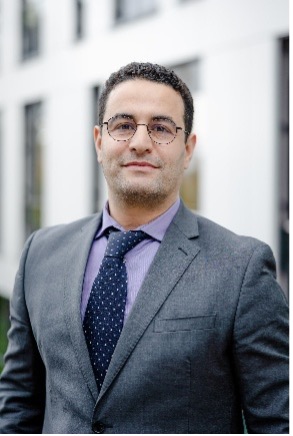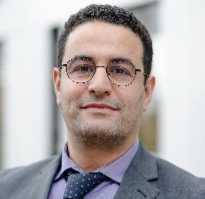Session Name: Shaping the Future of 6G: Innovation, Intelligence, and Sustainability
Advancing 6G Innovation in Europe: Results and Lessons from the 6G-PATH Project

Dr. Luís Cordeiro
Technical Director
OneSource, Consultoria Informática, Lda.
Technical Director
OneSource, Consultoria Informática, Lda.
Abstract
The 6G-PATH project is driving Europe’s transition toward next-generation communication systems by validating beyond-5G and 6G technologies through large-scale pilots and trials. The project explores how advanced capabilities such as AI-driven closed-loop automation, network slicing, and immersive media services can address the demanding requirements of verticals including farming, health, education, and smart cities.
This talk will share results and lessons learned from the first wave of experimentation activities. Key findings include the validation of critical technical KPIs and societal KVIs, insights into how B5G/6G together with the project's tools can streamline experimentation, and the importance of involving end users to ensure solutions are aligned with operational needs.
This talk will share results and lessons learned from the first wave of experimentation activities. Key findings include the validation of critical technical KPIs and societal KVIs, insights into how B5G/6G together with the project's tools can streamline experimentation, and the importance of involving end users to ensure solutions are aligned with operational needs.
Biography
Luís Cordeiro, male, Technical Director, MSc in Communications and Telematics. He has been actively involved in more than 15 European research projects, having served as Technical Coordinator of the H2020 EMPATIA and Horizon 6G-PATH projects. He has also led several projects focused on the development of specialised applications, in addition to dozens of software development and systems integration projects.
6G-Path to Cooperative End-to-End Autonomous Driving

Prof. Manabu Tsukada
Associate professor
The University of Tokyo, Japan
Associate professor
The University of Tokyo, Japan
Abstract
In the coming decade, 6G will play a pivotal role in redefining autonomous driving, shifting from rule-based modular systems to end-to-end AI-driven decision making. This talk explores how 6G communication foundations can support cooperative end-to-end driving systems, connecting vehicles, infrastructure, and humans. Building on our open-source work with Autoware and V2X cooperative perception, we discuss challenges of error accumulation, safety assurance, and generalization in autonomous systems—and how 6G features such as ultra-reliable low-latency communication, semantic feature sharing, and digital twins can overcome them. We then introduce our recent projects, including Co3SOP (collaborative semantic occupancy dataset), PHCP (heterogeneous cooperative perception), and PrefDrive (preference-guided LLM driving), which demonstrate practical steps toward end-to-end cooperative intelligence. By bridging machine-to-machine and machine-to-human communication, this talk highlights the role of 6G in realizing safe, efficient, and human-aligned autonomous mobility.
Biography
Dr. Manabu Tsukada is currently an associate professor at the Graduate School of Information Science and Technology, the University of Tokyo, Japan. He is also a designated associate professor at the Center for Embedded Computing Systems, Nagoya University, Japan. He received his B.S. and M.S degrees from Keio University, Japan, in 2005 and 2007, respectively. He worked in IMARA Team, Inria, France, during his Ph.D. course and obtained his Ph.D. degree from Centre de Robotique, Mines ParisTech, France, in 2011. During his pre and postdoc research stages, he has participated in a multitude of international projects in the networked ITS area, such as GeoNet, ITSSv6, SCORE@F, CVIS, Nautilus6, or ANEMONE. He served as a board member of the WIDE Project 2014-2022. His research interests are mobility support for the next-generation Internet (IPv6), Internet audio-visual media, and communications for intelligent vehicles.
Key Value Indicators for 6G: Evaluating Economic, Social, Environmental, and Service Quality Impacts through Performance Metrics and Sustainability Assessment

Prof. Jing Li
Associate Director
University of Bradford, UK
Associate Director
University of Bradford, UK
Abstract
The evolution towards 6G networks is expected to deliver disruptive capabilities that extend beyond enhanced connectivity to measurable economic, social, environmental, and service impacts. To demonstrate these impacts, it is essential to establish Key Value Indicators (KVIs) linked to quantifiable Key Performance Indicators (KPIs), including Quality of Service (QoS) and Quality of Experience (QoE) metrics. This paper evaluates the 6G-PATH project by mapping KVIs and Key Value Enablers (KVEs) to use cases across multiple industry verticals. The analysis incorporates economic performance, social outcomes, environmental dimensions, and service quality. The research introduces a framework to capture interdependencies, system-level trade-offs, and unintended consequences of 6G-enabled solutions. The framework demonstrates how 6G can be assessed in terms of both technical performance and societal value, offering a mechanism for researchers, policymakers, and industry stakeholders to ensure that 6G deployment achieves net-positive outcomes across all dimensions.
Biography
Jing Li is a Reader in Accounting and Associate Director for the Institute of Digital & Sustainable Futures at the University of Bradford in the UK. Dr Li has over 17 years of experience in UK Higher Education and has held various academic leadership roles.
Dr Li's research expertise and interests span across corporate reporting and corporate governance, encompassing areas such as intellectual capital/ intangible assets reporting, narrative reporting (CSR and environmental reporting) and sustainability accounting and reporting, reporting quality and attributes, and corporate governance. She also enjoys conducting interdisciplinarity research that focuses on the intersection between sustainability and innovation and the use of large-scale data. Jing has worked on a project relating to big data analysis, and is interested in the application of big data analytic and AI in accounting and finance. She is also interested in work on the development of financial literacy in different stakeholder groups. Jing has published in reputable journals including Accounting & Business Research, British Accounting Review, Journal of Accounting, Auditing & Finance, International Review of Financial Analysis, Energy Economics, Technological Forecasting and Social Change, Journal of International Financial Markets, Institutions and Money, Journal of Applied Accounting Research, Physica A: Statistical Mechanics and Its Applications, Business Strategy and the Environment, Annals of Operations Research, and more.
Dr Li has R&D funding from external bodies such as the Innovate UK, the Institute of Chartered Accountants of Scotland and the European Commission. Her latest R&D
Dr Li's research expertise and interests span across corporate reporting and corporate governance, encompassing areas such as intellectual capital/ intangible assets reporting, narrative reporting (CSR and environmental reporting) and sustainability accounting and reporting, reporting quality and attributes, and corporate governance. She also enjoys conducting interdisciplinarity research that focuses on the intersection between sustainability and innovation and the use of large-scale data. Jing has worked on a project relating to big data analysis, and is interested in the application of big data analytic and AI in accounting and finance. She is also interested in work on the development of financial literacy in different stakeholder groups. Jing has published in reputable journals including Accounting & Business Research, British Accounting Review, Journal of Accounting, Auditing & Finance, International Review of Financial Analysis, Energy Economics, Technological Forecasting and Social Change, Journal of International Financial Markets, Institutions and Money, Journal of Applied Accounting Research, Physica A: Statistical Mechanics and Its Applications, Business Strategy and the Environment, Annals of Operations Research, and more.
Dr Li has R&D funding from external bodies such as the Innovate UK, the Institute of Chartered Accountants of Scotland and the European Commission. Her latest R&D
The Rigourous approach for Privacy-preserving and FL-based Anomaly Detection in B5G Networks

Prof. Jorge Bernal Bernabe
Associate Professor
University of Murcia, Spain
Associate Professor
University of Murcia, Spain
Abstract
AI-driven network security management in Beyond 5G networks embraces the exciting challenge of addressing scalability, dynamicity, interoperability, privacy, and security concerns. These are essential steps towards achieving the realization of truly ubiquitous AI-based analytics, empowering seamless integration across
the entire Continuum (Edge, Fog, Core, Cloud). To address these challenges, this talk will present a model driven Federated learning approach for managing and Orchestrating the Network intelligence needed to detect and prevent cyber-attacks in B5G networks. The system has been developed in the scope of EU project Rigourous aimed to devise and develop advanced security and privacy solutions for next-gen networks, using AI and machine learning to improve threat detection and incident response. The solution includes a multi-domain and multi-tenant Orchestrator thereby endowing the Network management with key features for automated and scalable deployment of FL-agents and AI-based anomaly detectors, strengthening the reaction capabilities to counter cyber-attacks. The framework has been reinforced to cope with adversarial attacks by combining the usage of privacy techniques such as Differential Privacy during the FL agent’s training. The implementation includes different FL enforcement operations for allowing interoperability and extensibility in the management of the FL system.
Biography
Jorge Bernal Bernabe received the MSc, Master, and PhD in Computer Science as well as an MBA from the University of Murcia (Spain). He was accredited as Associate Professor (“Profesor Titular”) by Spanish ANECA in 2020 and granted the “Best PhD Thesis Award” from the School of Computer Science of the University of Murcia 2015. In 2017 he was granted a postdoctoral research grant funded by INCIBE (Spanish National Cybersecurity Institute) and afterward, in 2019, he won an AXA Postdoctoral Scholarship awarded by the AXA Research Fund. Since February 2023 he is an Associate professor (Profesor Titular) in the Department of Information and Communications Engineering of the University of Murcia. Jorge Bernal has been a visiting researcher in the Cloud and Security Lab of Hewlett-Packard Laboratories (Bristol UK) and in the University of the West of Scotland. Author of more than 45 papers published in JCR-indexed impact journals, plus numerous conference papers and book chapters. He has been involved in the scientific committee of numerous conferences and served as a reviewer for multiple journals. During the last years, he has been working on several European research projects FP7 and H2020, such as Inter-Trust, ARIES, ANASTACIA, CyberSec4Europe, Inspire-5Gplus, Olympus, RIGOUROUS, ResilMesh. His scientific activity is mainly devoted to security, trust, and privacy management in distributed systems. He is also interested in the security and privacy aspects of the Internet of Things. Metrics: over 4000 citations in Google Scholar, h index : h34, i10 index: 62.
MIRO: Rethinking Multi-Domain Resource Orchestration through AI and LLM Innovation – Part 1

Prof. Dr. Tarik Taleb
Professor/Board Chair
Ruhr University Bochum, Germany, ICTFICIAL Oy, Finland
Professor/Board Chair
Ruhr University Bochum, Germany, ICTFICIAL Oy, Finland
Abstract
The proliferation of distributed cloud and edge infrastructures has introduced new complexity in managing applications and resources across multi-domain environments. This presentation introduces a cloud-native solution that combines intent-based interaction, supported by LLMs, with AI-driven scheduling to deliver autonomous and context-aware orchestration. Through natural language intents, operators and developers can define high-level objectives that are automatically translated into executable orchestration policies. This intent-based paradigm lowers technical barriers, making multi-cluster resource management more accessible while maintaining precision and scalability. At the same time, advanced AI models continuously optimize scheduling, balancing performance, resource efficiency, and resilience across federated Kubernetes clusters.
Biography
Tarik Taleb is currently a Full Professor with Ruhr University Bochum, Germany, and the Founder and Director of the MOSA!C Lab, as well as the Founder of ICTFICAL Oy.
He was previously a Professor with the Centre for Wireless Communications (CWC), University of Oulu, Finland, and from 2014 to 2021 served as an Associate Professor with the School of Electrical Engineering at Aalto University, Espoo, Finland. Earlier, he worked as a Senior Researcher and 3GPP Standards Expert with NEC Europe Ltd., Heidelberg, Germany, where he was actively involved in the development and standardization of the Evolved Packet System as part of the 3GPP System Architecture Working Group. Before joining NEC, and until March 2009, he was an Assistant Professor with the Graduate School of Information Sciences at Tohoku University, in a laboratory fully funded by KDDI. From 2005 to 2006, he was a Research Fellow with the Intelligent Cosmos Research Institute, Sendai, Japan. He received the B.E. degree (with distinction) in Information Engineering and the M.Sc. and Ph.D. degrees in Information Sciences from Tohoku University, Sendai, Japan, in 2001, 2003, and 2005, respectively.
His current research interests include AI-driven network management, architectural advancements for mobile core networks, network softwarization and slicing, mobile cloud networking, SDN/NFV, software-defined security, and mobile multimedia streaming.
His current research interests include AI-driven network management, architectural advancements for mobile core networks, network softwarization and slicing, mobile cloud networking, SDN/NFV, software-defined security, and mobile multimedia streaming.
MIRO: Rethinking Multi-Domain Resource Orchestration through AI and LLM Innovation – Part 2

Dr. Luís Miguel Batista Rosa
Project Manager
OneSource, Consultoria Informática, Lda., Portugal
Project Manager
OneSource, Consultoria Informática, Lda., Portugal
Abstract
The proliferation of distributed cloud and edge infrastructures has introduced new complexity in managing applications and resources across multi-domain environments. This presentation introduces a cloud-native solution that combines intent-based interaction, supported by LLMs, with AI-driven scheduling to deliver autonomous and context-aware orchestration. Through natural language intents, operators and developers can define high-level objectives that are automatically translated into executable orchestration policies. This intent-based paradigm lowers technical barriers, making multi-cluster resource management more accessible while maintaining precision and scalability. At the same time, advanced AI models continuously optimize scheduling, balancing performance, resource efficiency, and resilience across federated Kubernetes clusters.
Biography
Luís Rosa, male, Project Manager, PhD in Information Science and Technology from the University of Coimbra (2021). His research interests focus on edge and cloud computing, AI mechanisms, cybersecurity and anomaly detection in Big Data contexts, as well as critical infrastructure protection. He is the author of more than 20 scientific publications and has contributed as a researcher to various European research projects in these areas.
Panel Name: AI for 6G and Beyond: Intelligent Networks and Digital Twin Synergies
- Panel Moderator: Dr. Luís Cordeiro, OneSource, Consultoria Informática, Lda., Portugal
-
Panel Abstract:
This panel brings together leading experts to discuss how Artificial Intelligence will drive the design, deployment, and operation of 6G and beyond networks. The conversation will explore how AI enables adaptive, efficient, and autonomous network intelligence, while also examining the role of digital twins as both a supported application of 6G and a powerful tool to optimize and accelerate its development. Panellists will highlight the bidirectional relationship between AI-driven digital twins and next-generation connectivity, offering insights into the path toward resilient, sustainable, and human-centric networks. -
Panellists:
1. Dr. Namseok Ko, ETRI, South Korea 2. Prof. Manabu Tsukada, The University of Tokyo, Japan
2. Prof. Manabu Tsukada, The University of Tokyo, Japan 3. Prof. Jing Li, University of Bradford, UK
3. Prof. Jing Li, University of Bradford, UK
4. Prof. Jorge Bernal Bernabe, University of Murcia, Spain 5. Prof. Dr. Tarik Taleb, Ruhr University Bochum, Germany, ICTFICIAL Oy, Finland
5. Prof. Dr. Tarik Taleb, Ruhr University Bochum, Germany, ICTFICIAL Oy, Finland 6. Dr. Luís Miguel Batista Rosa, OneSource, Consultoria Informática, Lda., Portugal
6. Dr. Luís Miguel Batista Rosa, OneSource, Consultoria Informática, Lda., Portugal
